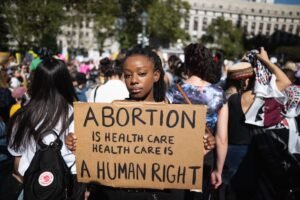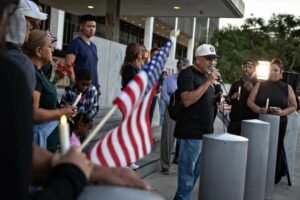The ongoing legal battle over more than 60,000 challenged ballots in the North Carolina Supreme Court race has taken a new turn, as Republican Jefferson Griffin petitions the state’s highest court to intervene. Griffin, who trails Democratic incumbent Allison Riggs by just 734 votes after two recounts, argues that the ballots in question—allegedly cast by ineligible voters—could change the outcome of the race if removed.
The State Board of Elections, which has a 3-2 Democratic majority, dismissed Griffin’s protests last week. However, the board has yet to certify the election results, leaving the outcome in limbo. Griffin’s filing asks the North Carolina Supreme Court, which currently holds a 5-2 Republican majority, to halt certification and evaluate his claims.
Griffin’s Argument: A Question of Sovereignty
Griffin’s case rests on what he calls a “fundamental question” of election governance. “Who decides our election laws?” Griffin wrote in his Wednesday legal filing. “Is it the people and their elected representatives, or the unelected bureaucrats sitting on the State Board of Elections?”
The crux of Griffin’s challenge is the eligibility of certain voters. His legal team claims that many of the challenged ballots were cast by individuals who either lacked proper voter registration documentation—such as a driver’s license or Social Security number—or were otherwise ineligible under state law.
This argument echoes a lawsuit filed earlier this year by the Republican National Committee, which sought to remove 225,000 voters from the rolls on similar grounds. That case, heard by a federal judge appointed by former President Donald Trump, was partially rejected, though it remains unresolved.
Griffin also expressed concerns that Democrats would move the case to federal court if he pursued the typical appeal process through Wake County Superior Court. By requesting the state Supreme Court’s direct involvement, Griffin argues that state jurisdiction over election laws would be preserved.
The Democratic Response: Allegations of Overreach
Democrats, including Riggs’ legal team, contend that Griffin’s claims are baseless and an attempt to overturn legitimate election results. North Carolina Democratic Party Chair Anderson Clayton accused Griffin of seeking to have “the Republican-controlled state Supreme Court toss out legitimate ballots and hand this seat to him.”
The State Board of Elections, voting mostly along party lines, rejected Griffin’s protests, citing a lack of evidence for widespread voter ineligibility. Alan Hirsch, the Democratic chair of the board, defended the integrity of the election process.
“The idea that someone who was registered to vote, showed up to vote, and cast their ballot could then have their vote discarded is anathema to the democratic system and simply cannot be tolerated,” Hirsch said during last week’s hearing.
Hirsch and other Democrats on the board argued that clerical errors or mismatches in national databases could account for missing voter registration information. They also pointed out that all voters in the election were required to show ID, reducing the likelihood of ineligible ballots being counted.
Republican Concerns: Addressing Voter Registration Issues
Republicans on the board acknowledged the lack of fraud allegations but expressed frustration over the state’s handling of voter registration discrepancies. Stacy “Four” Eggers, a Republican board member, argued that the State Board of Elections should have taken steps earlier to verify registration documentation for voters flagged as incomplete.
“This is a self-inflicted wound,” Eggers said, adding that the state should have reached out to affected voters during the primary and general elections to correct these issues.
Legal Precedent and Broader Implications
The dispute over voter eligibility taps into a broader debate about election integrity and access. While Griffin’s legal team frames the issue as a matter of upholding state law, critics argue that his challenge risks disenfranchising voters based on technicalities.
The courts have previously weighed in on similar disputes, often siding with inclusivity over restrictive interpretations of voter eligibility. For example, the federal judge in the RNC case ruled that incomplete voter registration information alone does not necessarily render a voter ineligible.
The outcome of Griffin’s case could have significant implications for future elections in North Carolina, especially as Republicans prepare to take control of the State Board of Elections next spring under a new law passed by the legislature.
What’s Next?
The North Carolina Supreme Court has not yet announced whether it will hear Griffin’s case. If the court intervenes, its decision could set a precedent for how election disputes are handled in the state moving forward.
Meanwhile, the State Board of Elections must decide whether to certify the results as they stand or await further court rulings.
Stay tuned to the Bull City Citizen for updates on this developing story, as we continue to provide in-depth, unbiased coverage of key political and legal issues shaping our community.
Related Articles
• “NC Elections Board Rejects GOP Challenge of 60,000 Ballots” (Bull City Citizen, Dec. 11, 2024)
• “NC Supreme Court Race: A Closer Look at the Contested Ballots” (Bull City Citizen, Dec. 8, 2024)
For more election updates and investigative reporting, subscribe to the Bull City Citizen. Trusted news, delivered daily.












